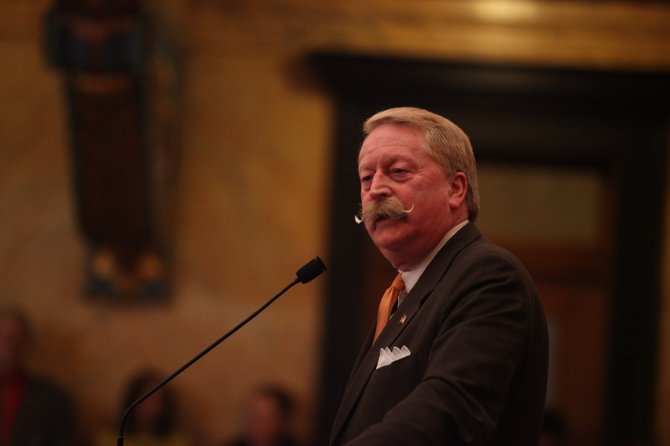Republican Reps. Jeff Smith (pictured) and Gary Chism of Columbus authored a widely ridiculed “sovereignty” bill to exempt Mississippi from following federal law. Photo by Courtesy Amile Wilson
The Mississippi House of Representatives bandied its version of a charter-school bill for more than eight hours until close to 1 a.m., eclipsing the Senate's four-hour-long debate the previous week.
Exchanges were often contentious, prompting some lawmakers to acknowledge the deliberations' resemblance to "30 hissing possums in a barn" as lampooned by "Saturday Night Live" recently.
Apparently, two lawmakers weren't content with the national exposure from SNL, so they proffered legislation that became more fodder for ridiculing the Magnolia State. Reps. Jeff Smith and Gary Chism, both Republicans from Columbus, co-authored HB 490, which clarifies that "protected rights under state sovereignty may not be infringed upon by federal action(s)."
Bloggers and local columnists derided the bill as an absurd attempt to resuscitate the Mississippi State Sovereignty Commission, which--as Smith and Chism are old enough and presumably intelligent enough to know--was a clandestine organization the Legislature created to "protect the sovereignty of the state of Mississippi, and her sister states" from "encroachment" from the federal government (mainly by spying on Mississippi's citizens and "outside agitators" working to end the state's racial segregation laws).
HB 490 is the latest in a litany of initiatives Republicans have floated since Barack Obama won a second White House term. Gov. Phil Bryant has been saying for months that he'll refuse to implement Obamacare and last week asked lawmakers to draft legislation permitting the state to opt out of complying with federal gun regulations.
For now, HB 490's fate rests with Constitution Committee Chairman Scott Delano, R-Biloxi.
Rethinking Prisons
Rep. George Flaggs, chairman of the House Corrections Committee, isn't going out without a fight. Flaggs, who is retiring after the session ends to run for mayor of Vicksburg, delivered the only impassioned speech from a Democrat in support of charter schools last week.
He was responding in part to Rep. John Hines, D-Greenville, who suggested that instead of offering charter schools as a cure-all to the state's education woes, that Flaggs should sit down with House Education Committee Chairman John Moore, R-Brandon, to talk about how to keep young people from going to prison.
Mississippi has the nation's second-highest incarceration rate, and the number of inmates housed in the state prison has risen so drastically that the Mississippi Department of Corrections requested a deficit appropriation of $29.5 million for the current fiscal year.
Flaggs said his bill is based on a recent change to Georgia law that gives judges more leeway on sentencing guidelines and said on the floor that Speaker Philip Gunn and Lt. Gov. Tate Reeves gave their blessings to the measure.
Hospitals: Critical Condition
You've probably read about how health care is a rapidly growing industry, that there are jobs galore available in the medical field. Well, hospitals say not to believe the hype.
"My margins are gone," said Chris Anderson, chief executive officer of Ocean Springs-based Singing River Health System.
In the past 18 months, Anderson said the hospital has cut 227 non- clinical positions.
Gary Marchand, chief executive officer of Memorial Hospital in Gulfport, has had similar experiences. Marchand's hospital's uncompensated costs have risen from $10 million in 2011 to $13 million in 2012, mostly due to in-patient mental-health services.
The hospitals approached the committee to complain about changes in how the state reimburses hospitals for certain health-care costs.
Last year, the state switched to a Diagnostic-Related Group payment model, which means the state pays health providers according to a specific diagnoses rather than by the length of a patient's stay in the hospital.
Gwen Combs, vice president for policy for the Mississippi Hospital Association, said she believed state officials made a miscalculation when developing its formula that resulted in hospitals receiving smaller reimbursements than they should have.
Anderson estimated his system would have to eliminate 200 to 300 more jobs if changes are not made to remedy the problem with the reimburse- ment formula.
"That's not the sky is falling, that's reality," Anderson said.
State Medicaid Director Dr. David Dzielak expressed frustration that the hospitals bypassed his agency and went directly to the Legislature. Dzielak encouraged the executives to speak with him should any future problems arise.
"It is not our intent to put anyone out of business," Dzeliak said.
Email: [email protected]. Get daily legislative news at jfpdaily.com.



Comments
Use the comment form below to begin a discussion about this content.
comments powered by Disqus